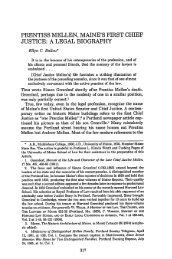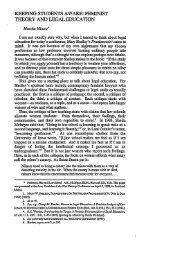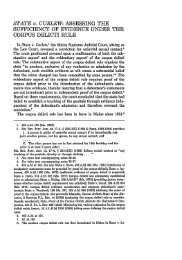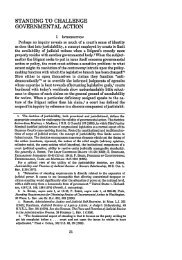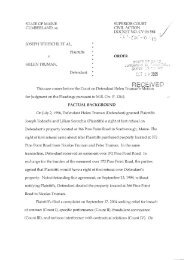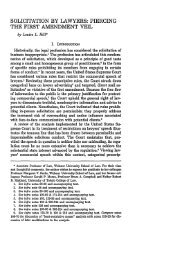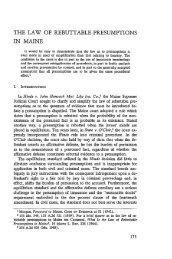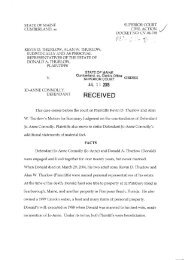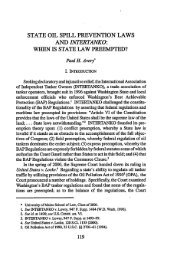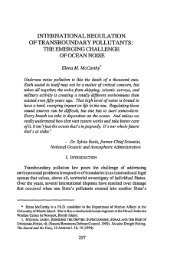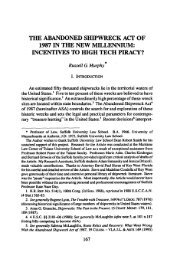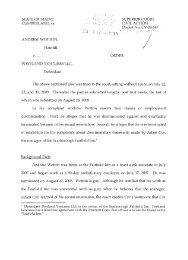New Dean Peter Pitegoff - University of Maine School of Law ...
New Dean Peter Pitegoff - University of Maine School of Law ...
New Dean Peter Pitegoff - University of Maine School of Law ...
You also want an ePaper? Increase the reach of your titles
YUMPU automatically turns print PDFs into web optimized ePapers that Google loves.
Gregory Smith ’73<br />
Take Risks<br />
The career <strong>of</strong> Gregory Smith ’73 (pictured with his<br />
sons at Fenway Park) has taken a number <strong>of</strong><br />
unexpected turns. Today, he is a highly regarded expert<br />
on environmental law.<br />
Just when Gregory H. Smith ’73<br />
thought he knew exactly what lay ahead<br />
for him, life presented starkly different<br />
options. It’s been the pattern <strong>of</strong> his life.<br />
At each juncture, he consciously chose<br />
the new opportunity over what he had anticipated.<br />
That approach led him to become<br />
<strong>New</strong> Hampshire’s attorney general and now a<br />
highly regarded expert on environmental law.<br />
One <strong>of</strong> his first sudden shifts <strong>of</strong> fate was<br />
a last-minute chance to further his education.<br />
Having grown up on a family dairy<br />
farm in rural <strong>New</strong> Hampshire at a time<br />
when many such enterprises were going<br />
under, Smith faced the reality that college<br />
was out <strong>of</strong> the question. A family friend,<br />
however, arranged for financial support for<br />
him to attend the <strong>University</strong> <strong>of</strong> <strong>New</strong><br />
Hampshire. He interviewed in August and<br />
returned 30 days later as a student.<br />
He majored in chemistry and figured<br />
he’d become a research scientist. “You<br />
adapt to other people’s view <strong>of</strong> you, and for<br />
me, that view was that I was good at science<br />
and math,” Smith says. “But the truth<br />
was that it wasn’t something that excited<br />
me at all. When I read, I loved biographies<br />
and books about history and government<br />
leaders. I guess it took me a while to finally<br />
catch up with myself.”<br />
After college in 1969, he was two weeks<br />
from entering military <strong>of</strong>ficer school in<br />
Texas when his mother learned that<br />
Cheverus High <strong>School</strong> in Portland needed<br />
a physics, science, and math teacher. Smith<br />
had no plans to make a career <strong>of</strong> teaching,<br />
but was impressed at his interview, got a<br />
military deferment, and took the job.<br />
This unexpected turn led to another<br />
that fall when visiting college buddies suggested<br />
on a lark that they all take the<br />
LSAT. Smith did well. “I had thought<br />
teaching was a step to graduate school in<br />
chemistry, and I had never even thought <strong>of</strong><br />
going to law school.”<br />
Nevertheless, next thing he knew, he<br />
was enrolled at <strong>Maine</strong> <strong>Law</strong>. Throughout<br />
law school—where he was editor <strong>of</strong> the<br />
<strong>Maine</strong> <strong>Law</strong> Review and worked at the<br />
then-new Cumberland Legal Aid Clinic—<br />
Smith intended to spend his legal career<br />
advocating for the impoverished and disadvantaged.<br />
So when he graduated, he<br />
applied only to legal aid organizations, the<br />
courts, and the <strong>New</strong> Hampshire Attorney<br />
General’s Office, seeking to handle public<br />
interest cases there.<br />
And who should <strong>of</strong>fer him an unusual<br />
opportunity but <strong>New</strong> Hampshire’s Deputy<br />
Attorney General David H. Souter—now a<br />
U.S. Supreme Court justice—and Attorney<br />
General Warren B. Rudman, later a U.S.<br />
senator. “David Souter asked me if I’d ever<br />
thought <strong>of</strong> being a homicide prosecutor,<br />
and I said no. He said that if I’d consider it,<br />
within a year or so I’d learn how to try a<br />
murder case.”<br />
Smith wrestled with the decision. The<br />
job was so outside the realm <strong>of</strong> what he<br />
had set his sights on for three years. He<br />
realized it <strong>of</strong>fered him exceptional training,<br />
but for Smith, who had always been<br />
uncomfortable in the spotlight, the idea <strong>of</strong><br />
standing up in court and trying a murder<br />
case was utterly out <strong>of</strong> his comfort zone.<br />
However, as unsure as he was, that’s the<br />
path he chose. Asked in his interview where<br />
he’d like to be in ten years, Smith told<br />
Souter that he’d like to be near the center <strong>of</strong><br />
public policy decision-making but that he<br />
didn’t feel well-suited to high public <strong>of</strong>fice<br />
5<br />
himself. Justice Souter apparently thought<br />
otherwise. Within seven years, Smith was<br />
the State Attorney General, having quickly<br />
risen through the ranks as openings occurred.<br />
He served until 1984, when he left to<br />
join McLane, Graf, Raulerson &<br />
Middleton, first in Manchester, then opening<br />
the State Capitol <strong>of</strong>fice in Concord. In<br />
this case, he thought he was “taking a path<br />
that would, for the first time since the age<br />
<strong>of</strong> 15, allow more time for life outside<br />
work,” contends Smith.<br />
In actuality, though, he didn’t plot a<br />
simpler course at all. Smith could have<br />
eased into an area he knew well but asked<br />
instead to build an environmental law<br />
practice. He liked the idea <strong>of</strong> working in a<br />
rapidly emerging area <strong>of</strong> regulatory law and<br />
had handled some cases involving the<br />
Clean Air and Clean Water acts and<br />
Superfund sites.<br />
But he was by no means an expert. He<br />
hit the books and started learning, gaining<br />
knowledge with each case. Twenty-one<br />
years later, he chairs the firm’s environmental<br />
department and government rela-<br />
Each time I went in a different direction, I thought <strong>of</strong> it like a<br />
bitter pill—it wasn’t going to taste good, but it would be good for me.<br />
I knew I needed to force myself to stand up and try it.<br />
tions practice and is one <strong>of</strong> his state’s most<br />
respected environmental and administrative<br />
law practitioners.<br />
About eight years ago, he got his firm<br />
involved with a world network <strong>of</strong> law firms,<br />
and that has allowed him to realize a dream<br />
<strong>of</strong> traveling he’d had since boyhood. Last<br />
year, Smith took a sabbatical to spend time<br />
in Europe with his sons, Ge<strong>of</strong>frey, 27, and<br />
Stuart, 24.<br />
When asked why he repeatedly chose<br />
the tougher road in his career: “It might<br />
have been for lack <strong>of</strong> good, thorough analysis,”<br />
Smith jokes. “But each time I went in a<br />
different direction, I thought <strong>of</strong> it like a bitter<br />
pill—it wasn’t going to taste good, but it<br />
would be good for me. I knew I needed to<br />
force myself to stand up and try it.”



